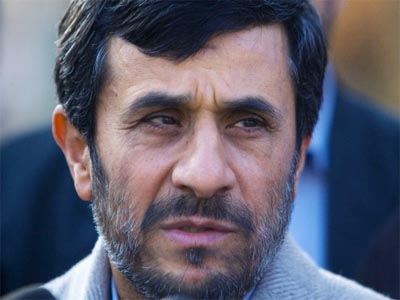Iranian opposition focuses on economy to defeat Ahmadinejad
 Tehran - Opposition groups in Iran have many differences among each other but are unanimous on one issue: President Mahmoud Ahmadinejad should go.
Tehran - Opposition groups in Iran have many differences among each other but are unanimous on one issue: President Mahmoud Ahmadinejad should go.
Many observers believed that the strategy by the opposition for the June 12 presidential election would be focused on Ahmadinejad's foreign policy, such as his uncompromising stance in the nuclear dispute that has led the country toward international isolation.
The president's tirades against Israel and denial of the World War II Holocaust, which have sparked harsh international protests, might have been suitable targets for the opposition, too.
But, ultimately, not talks with new US President Barack Obama but Iran's own economy was judged to be the main issue, and former prime minister Mir-Hossein Moussavi, not former president Mohammad Khatami, was found to be the man to challenge Ahmadinejad.
"Ordinary people in Iran do not care about whether there will be resumption of talks with Obama or whether Iran would suspend nuclear work or not, but their main concern is how to pay their rents and feed their families," a Tehran political analyst said.
Despite the foreign-policy problems Ahmadinejad has faced since taking office in 2005, the people - including his own supporters - mainly blame the president for having not fulfilled his economic promises in favour of the middle-class and low-income people.
With an official inflation rate of almost 30 per cent - unofficially even higher - life has become very hard not only for the poor.
"Realistic economic reforms is the only way for the opposition to encourage people to go voting and make the change and Ahmadinejad's removal possible," said a source close to Iran's Labour Party.
Recognizing the political landscape, the charismatic Khatami withdrew his candidacy in favour of the 67-year-old Moussavi, who is known for his economic know-how and close relationships with labour unions.
He proved his skills as crisis manager during the 1980-88 Iran- Iraq war, when he was prime minister.
"Ahmadinejad won the 2005 election due to his focus on economy, and the opposition hopes that economy will be the main reason for him to lose," a journalist in Tehran said.
Observers believe that as Moussavi is ideologically on the same political frequency as Ahmadinejad - loyal to the Islamic system, anti-American and with a leftist trend on economic issues - even some of the disappointed supporters of the president might switch to his side.
Just as Ahmadinejad was celebrated in 2005 as the Islamic Robin Hood, Moussavi's supporters call him "the hero supporting the poor."
On the other hand, due to his close cooperation with Khatami in recent years - presidential advisor from 1997 to 2005 - Moussavi is classified as more moderate than Ahmadinejad and more open to reforms.
"When we had a lot of foreign currency income (through oil exports), we did not plan anything for the (current) recession phase," Moussavi said in his first campaign speech, criticizing Ahmadinejad's economic policies.
"Nobody (in the Ahmadinejad government) listened to economic and political experts who had warned that there would be ups and downs."
Observers, however, doubt that Moussavi could mobilize the masses like the charismatic Khatami did in the 1997 and 2001 elections, which put Iran on an eight-year reform course with the aim of establishing an Islamic democracy. (dpa)